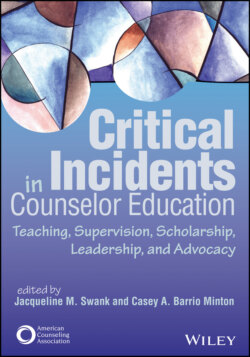Читать книгу Critical Incidents in Counselor Education - Группа авторов - Страница 46
Discussion of Actions Taken and Not Taken
ОглавлениеProfessor X acted diligently in offering clear and timely feedback to Jessie on the problematic nature of her disclosure. At their meeting, she could have discussed other topics related to gatekeeping as a reminder of counselor educators’ obligations when competency concerns arise. Students often do not recall details of gatekeeping policies, which many programs only review during orientation sessions (J. M. Foster et al., 2014); having them indicate their acknowledgment and understanding of them at multiple points, both orally and in writing, is recommended (Pease-Carter & Barrio Minton, 2012). At the first incident, there was no indication that the concerns would develop into a gatekeeping issue; however, a reminder of Professor X’s role in evaluating students could have been helpful. In addition, if the program designated the course a gatekeeping course, a reminder of this fact could be included as well. Given Jessie’s possible undisclosed disability, offering broad information about accommodations available to all students could help Jessie learn about potential options she could pursue.
Professor X may have also consulted with other faculty after the first incident. Consulting is best practice for the continued growth of educators and supervisors and also has the benefit of offering support in challenging scenarios. Given that a colleague was asked to help during the second incident in the classroom, making sure colleagues were aware and up-to-date on the circumstances would have been useful to ensure effective intervention in the moment. After the second incident, it would be advisable for Professor X to consult with colleagues and document the competency concerns noted (Homrich & Henderson, 2018). Regardless of a student’s initiative in terms of seeking personal counseling, Professor X could have recommended or required counseling as part of remediation. Counselor educators are responsible for requiring students to address personal issues that might impact their professional competence, and faculty may help students identify appropriate clinicians (ACA, 2014, Standards F.8.d., F.9.c.).
An additional concern is Jessie’s rationale that her peers could benefit from her disclosure. This perspective seems to indicate a lack of abiding by course policy and could be viewed as similar to refusing to incorporate feedback, a common competency expected of students (Homrich & Henderson, 2018). Professor X indirectly broached this topic but did not directly connect it to Jessie’s decision-making and lack of abiding by course policy.
Professor X and a colleague met with Jessie the next day. Jessie shared that she realized she needed a new counselor who could better help her as she was transitioning into her new role as a graduate student. She realized the two incidents probably indicated she needed at least a few tune-up sessions regarding her trauma history as well. The faculty members validated her self-awareness and encouraged her pursuit of self-growth and her decision to re-enter counseling. They shared information about the campus counseling center, where all students could obtain counseling from licensed clinicians. Professor X suggested Jessie consider consulting with her instructor regarding possible accommodations for triggering course content when she enrolled in the Crisis and Trauma course. Jessie devised a formal written plan with the note that any additional concerns would result in a review for formal remediation. Jessie entered personal counseling and fulfilled the agreement. The faculty did not note any future disclosures of too much information or any additional concerns.
